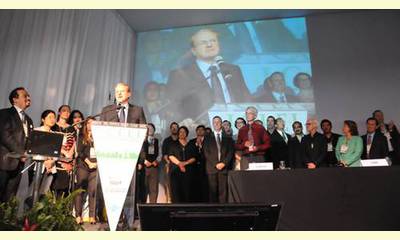|
|
ICLEI World Congress 2012 ends with powerful message to Rio+20
un articulo por Gobernanza Local (abridged)
Examples presented by cities around the world in the past four days of the ICLEI World Congress 2012 [Local Governments for Sustainability] have demonstrated that over the past 20 years, the advances of local governments in implementing sustainable development policies were higher than those observed globally. So, among other reasons, such as the fact that cities are the level of government closest to the citizen and space for change and innovation, the representatives of ICLEI prove that there needs to be recognition that local governments are effective drivers for sustainable development. This is the basic premise of the Message for the Rio +20 Conference, adopted on Sunday, 17 June, at the closing of the ICLEI World Congress 2012.

Photo by ICLEI
click on photo to enlarge
The Congress, held in Belo Horizonte 14-17 June and the first in Latin America, was considered the largest in the history of ICLEI with more than 1,200 participants. More than 1,200 representatives from 64 countries, including 79 mayors, showed in plenary sessions, workshops and the progress of municipalities in the adoption of effective measures aimed at sustainability. Innovative actions and policies have been reported, including those adopted in Belo Horizonte and several Brazilian cities, which effectively resulted in improved environmental quality and life in the cities, legitimizing the collection, the association, the greater recognition within the United Nations.
A message from the ICLEI World Congress for the Rio +20 will be delivered by the mayor of Belo Horizonte, Marcio Lacerda, to the United Nations (UN) on Thursday, 21 June, during “Global Town Hall – Cities Leadership for the 2030 Urban World” event of the Rio+20 Global Town Hall.
Lawmakers also pointed out the major challenges be faced as the Message for Rio +20 is the recognition that local governments are indeed governmental actors in the United Nations (UN) and should be given recognition, voice and direct access to national and international funds for development sustainable, and other considerations.
In the document, the participants proposed that this be recognized as the century of cities and that in the next 40 years, the urban expansion of capacity will be equivalent to that occurred in the past 4,000 years, presenting unprecedented challenges and opportunities to redesign and transform urban life. “We had in Belo Horizonte the biggest event in the history of ICLEI, as the largest mobilization not only of mayors and governors, but also to the public. This is the century of cities, is the century in which, to achieve a green and inclusive urban economy, we need to understand that cities are incubators of change, innovation incubators, where the action is actually the case, the level of governance is more close to the citizen, ” said the executive secretary of ICLEI South America, Florence Lalöe . . .
|








|
DISCUSSION
Pregunta(s) relacionada(s) al artículo :
How can culture of peace be developed at the municipal level?,
* * * * *
Comentario más reciente:
:
International Cities Choose Peace
J. Fred Arment
arment@internationalcitiesofpeace.org
International Cities of Peace, an association of global cities of peace, is using the U.N. Culture of Peace tenets as the guideline for forming initiatives. To date, thirty-one cities are part of the association. Some are grassroots organizations, others have the firm commitment by resolution or proclamation from the city council.
International Cities of Peace include the following:
• Dayton, Ohio, U.S.A.
• Eugene, Oregon, U.S.A.
• Unity Village, Missouri, U.S.A
• Coventry, England
• Bradford, England
• Guadalajara, Jalisco, Mexico
• Bukavu, Democratic Republic of Congo
• Mataki, Philippines
• Pathuthani, Thailand
• Fizi, Democratic Republic of Congo
• Lake County, California, U.S.A.
• Aba, Abia State, Nigeria
• Nagpur, India
• Reno, Nevada, U.S.A.
• Bujumbura, Burundi
• Mzuzu and Lilongwe, Malawi
• Tunis, Tunisia
• Tuolumne County, California, U.S.A.
• Bihac, Bosnia, Herzegovina
• Yaounde, Cameroon
• Freetown, Sierra Leone
• Nyala, Darfur, Sudan
• Bujumbura, Burundi
• Victoria, British Columbia, Canada
• Nakuru, Kenya
• Calgary, Alberta, Canada
• Kathmandu, Nepal
• Detroit, Michigan, U.S.A.
• Egg Harbor City, New Jersey, U.S.A.
• Warrake, Nigeria
• Kalamazoo, Michigan, U.S.A.
To start an initiative, go to the association's website for resources and tools.

|
|









